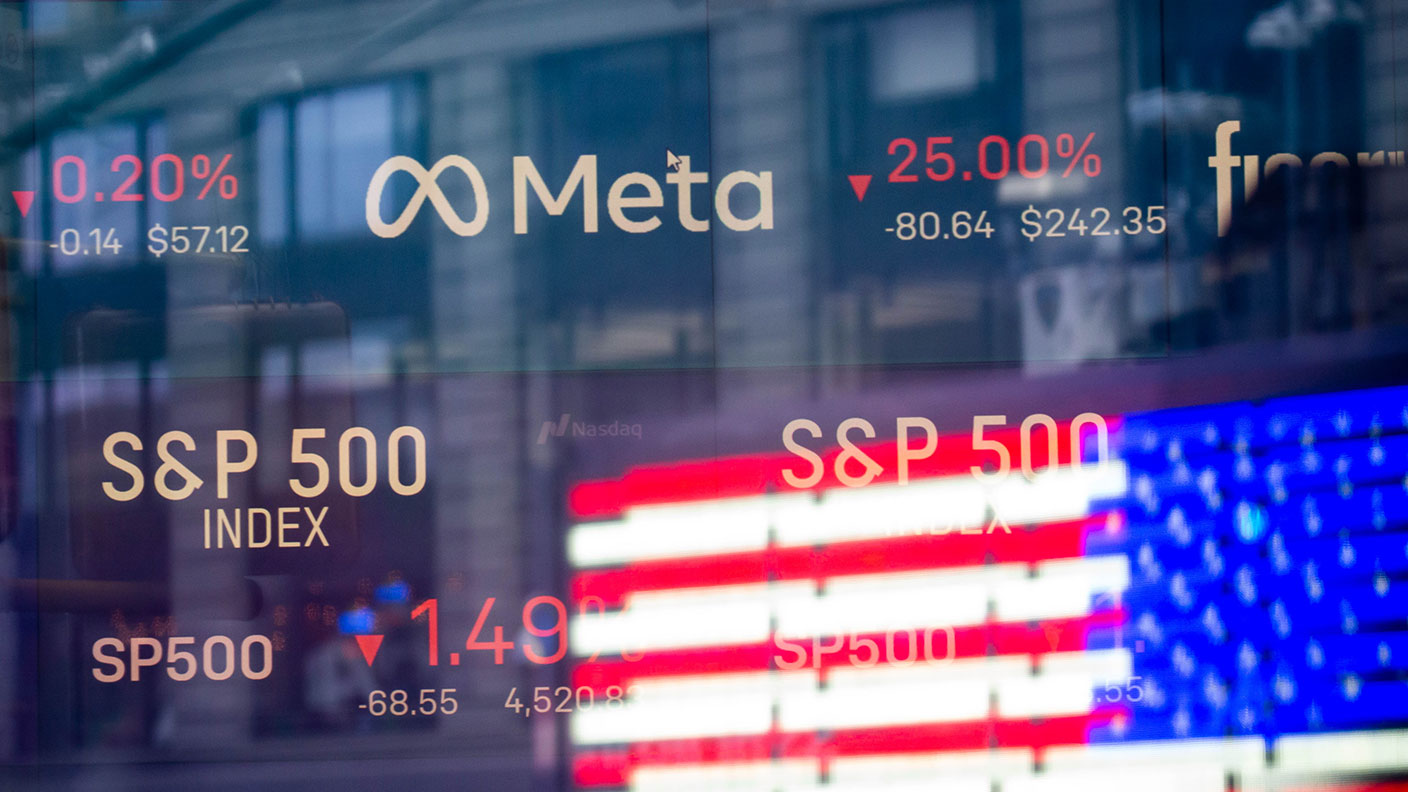The two nightmares facing investors
Rising inflation and weaker earnings suggest markets are set for a spell of toil and trouble, says Philip Pilkington.

Get the latest financial news, insights and expert analysis from our award-winning MoneyWeek team, to help you understand what really matters when it comes to your finances.
You are now subscribed
Your newsletter sign-up was successful
Want to add more newsletters?

Twice daily
MoneyWeek
Get the latest financial news, insights and expert analysis from our award-winning MoneyWeek team, to help you understand what really matters when it comes to your finances.

Four times a week
Look After My Bills
Sign up to our free money-saving newsletter, filled with the latest news and expert advice to help you find the best tips and deals for managing your bills. Start saving today!
Even before the outbreak of war last week, investors were getting rattled. Inflation is here to stay and markets are rightly concerned that 2022 will see the first in a series of US central-bank interest-rate rises.
How many rises do the markets fear? It depends on what day you ask them. When the clock struck 12 on New Year’s Eve, the markets were expecting two or three rate rises in 2022. At the time of writing, they are expecting six or seven.
This alone is enough to explain the sluggishness in markets. The S&P 500 now stands almost 5% lower than it was six months ago. The Nasdaq Composite is down more than 11% in the same period. Pity the person who bought into bitcoin close to its November peak, as it is now nearly 35% lower.
MoneyWeek
Subscribe to MoneyWeek today and get your first six magazine issues absolutely FREE

Sign up to Money Morning
Don't miss the latest investment and personal finances news, market analysis, plus money-saving tips with our free twice-daily newsletter
Don't miss the latest investment and personal finances news, market analysis, plus money-saving tips with our free twice-daily newsletter
Rates rises mean higher risk for investors. Investors argue for higher equity weights when interest rates are low. By the same logic, they should argue for lower weights when interest rates rise.
Individual investors are today overweight equities more than at any time in history. In the third quarter of 2021, US households were holding 37.4% of their financial assets as equities, beating out the previous peak of 32.5% – at the height of the dotcom bubble in the first quarter of 2000 – by a wide margin.
But rising interest rates are not the only headwind on the horizon for stockmarkets. Since the market dip in the first quarter of 2020 in response to the outbreak of Covid-19, markets have been getting pleasant surprises when earnings have been reported. Until the third quarter of 2021, earnings per share (EPS) estimates would rise as earnings season set in – that is, when companies publish their quarterly reports. Six weeks from the start of earnings season, estimates would rise by anywhere from 10%-20%.
Running out of surprises
The reader can imagine how this might build excitement in markets. Equity analysts would go into the earnings season expecting a decent outcome and would set their price targets on stocks in line with this – but would instead be confronted with windfall earnings. They would then raise their EPS estimate and price target. Seeing these windfall gains every earnings season for a whole year builds excitement on top of excitement.
That is now all over. Since the last earnings season in the fourth quarter of 2021, we have seen very little upward revision of EPS estimates. Forward estimates, which for the past year have risen in step with EPS revisions, have now actually fallen slightly.
To some extent this might be due to markets losing the capacity for surprise. That is, by baking in more and more windfall gains, markets may be difficult to shock at this stage. However, much of it is probably due to softer earnings.
We are getting some hint of this with the recent price action in stocks such as Meta Platforms (formerly Facebook) and Netflix. The Meta share price is down more than 45% from where it was six months ago; Netflix is down 33%. Until recently, these stocks were top of the deck, being part of the FAANG group (Facebook, Apple, Amazon, Netflix, Google). Now they look like dogs. They tanked because of serious problems with the business models of both companies.
Put simply, Meta and Netflix are finding that competitors such as TikTok and Amazon are taking their business. However, even tech companies with more solid business models are taking a hit. Amazon is down more than 12% in six months, while Google’s parent company Alphabet is down more than 7%.
This is due to the lockdown bonanza coming to an end for these companies. With high streets closed during lockdowns, consumers turned online for their shopping and entertainment. But as the world opens back up, consumers are re-engaging with the “meat world” of “in real life” (IRL, as the kids say) human interaction.
The lockdowns were great for large-cap, publicly traded companies, which saw their already entrenched monopolies gain even more monopolistic power thanks to government edicts. This papered over the cracks in shaky companies such as Meta and Netflix and gave more solid players like Amazon and Google a boost. But as with the EPS revisions, this trend, too, is now at an end.
So, here we are. Two unrelated nightmares to weigh on investors: rising inflation and interest rates on the one hand, and the end of the lockdown-induced earnings bonanzas on the other. Mr Market is going to have to come up with some fresh magic if he wants to continue lifting equity valuations ever higher and not succumb to a spot of toil and trouble.
Perhaps, to quote Shakespeare, he might try eye of newt and toe of frog. If that doesn’t work, he can switch to wool of bat and tongue of dog. But he’d better do so soon. Markets are feeling soft right now.
Get the latest financial news, insights and expert analysis from our award-winning MoneyWeek team, to help you understand what really matters when it comes to your finances.
Philip Pilkington is a macroeconomist and investment professional. He is the author of the book The Reformation in Economics, and blogs at Fixing the Economists and on Twitter @philippilk
-
 UK interest rates live: experts expect MPC to hold rates
UK interest rates live: experts expect MPC to hold ratesThe Bank of England’s Monetary Policy Committee (MPC) meets today to decide UK interest rates. The last meeting resulted in a cut, but experts think there is little chance of interest rates falling today.
-
 MoneyWeek Talks: The funds to choose in 2026
MoneyWeek Talks: The funds to choose in 2026Podcast Fidelity's Tom Stevenson reveals his top three funds for 2026 for your ISA or self-invested personal pension
-
 Three companies with deep economic moats to buy now
Three companies with deep economic moats to buy nowOpinion An economic moat can underpin a company's future returns. Here, Imran Sattar, portfolio manager at Edinburgh Investment Trust, selects three stocks to buy now
-
 Should you sell your Affirm stock?
Should you sell your Affirm stock?Affirm, a buy-now-pay-later lender, is vulnerable to a downturn. Investors are losing their enthusiasm, says Matthew Partridge
-
 Why it might be time to switch your pension strategy
Why it might be time to switch your pension strategyYour pension strategy may need tweaking – with many pension experts now arguing that 75 should be the pivotal age in your retirement planning.
-
 Beeks – building the infrastructure behind global markets
Beeks – building the infrastructure behind global marketsBeeks Financial Cloud has carved out a lucrative global niche in financial plumbing with smart strategies, says Jamie Ward
-
 Saba Capital: the hedge fund doing wonders for shareholder democracy
Saba Capital: the hedge fund doing wonders for shareholder democracyActivist hedge fund Saba Capital isn’t popular, but it has ignited a new age of shareholder engagement, says Rupert Hargreaves
-
 Silver has seen a record streak – will it continue?
Silver has seen a record streak – will it continue?Opinion The outlook for silver remains bullish despite recent huge price rises, says ByteTree’s Charlie Morris
-
 Investing in space – finding profits at the final frontier
Investing in space – finding profits at the final frontierGetting into space has never been cheaper thanks to private firms and reusable technology. That has sparked something of a gold rush in related industries, says Matthew Partridge
-
 Star fund managers – an investing style that’s out of fashion
Star fund managers – an investing style that’s out of fashionStar fund managers such as Terry Smith and Nick Train are at the mercy of wider market trends, says Cris Sholto Heaton